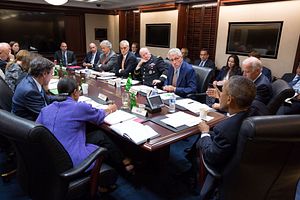Yesterday in a televised speech, President Barack Obama promised that the United States will work “with our friends and allies to degrade and ultimately destroy the terrorist group known as ISIL,” also called the Islamic State (IS). Washington hopes that China will join the coalition to fight against IS — but so far, Beijing has refused to commit either way.
National Security Advisor Susan Rice reportedly pushed for Chinese support during her visit to Beijing this week. As a senior administration official told the Washington Post, “We’re trying to build an international coalition, and it’s important China be a part of it.” The official added that “the Chinese expressed interest,” but that no firm commitment was made. According to the official, the U.S. and China continue to talk about how Beijing might contribute to the fight against IS.
In his speech on September 10, Obama particularly stressed the global stakes involved in the fight against IS. He noted that the group “poses a threat to the people of Iraq and Syria, and the broader Middle East … If left unchecked, these terrorists could pose a growing threat beyond that region, including to the United States.” His strategy for eliminating IS involves U.S. airstrikes against the group in both Iraq and Syria, U.S. support for partners “fighting these terrorists on the ground,” targeting IS through financial sanctions and counterintelligence, and humanitarian assistance for those affected by the ongoing violence. Obama also announced that he plans to chair a U.N. Security Council meeting to discuss how to combat IS. Obama will certainly need Chinese (and Russian) support to get any meaningful resolution through the U.N. Security Council. How far that support will extend is an open question.
China’s response to Obama’s speech was conflicted. On one hand, as Foreign Ministry spokesperson Hua Chunying made clear in her press conference on Thursday, “China firmly opposes any form of terrorism.” Having suffered a number of terrorist attacks on its own soil in the past year, Beijing is in the midst of its own anti-terrorism crackdown. Hua described the current outlook as China sees it: “The world is facing complex and severe anti-terrorism situation with the breeding ground for international terrorism yet to be eradicated and some regions still suffering from continuous instability.”
The “local hotbed of terrorism” as Hua called it, is dangerous for China as well. The leader of IS put China at the top of a list of countries accused of persecuting Muslims, thus making China a target for jihad. China also has concerns about its citizens training and fighting alongside IS and other extremist groups, then potentially returning to China to carry out attacks. The Iraqi Defense Ministry claimed last week to have captured a Chinese national fighting for IS; the Chinese Foreign Ministry is still verifying the report. More broadly, China is concerned about Uyghur militant groups like the East Turkestan Islamic Movement (ETIM) gaining new capabilities from interactions with other regional terrorist groups. Accordingly, Hua indicated that “China is willing to step up anti-terrorism communication and cooperation with the world and safeguard international peace and stability.”
However, Beijing is not willing to give direct support for U.S. military action within another country’s borders. Even while noting China’s staunch support for anti-terrorist efforts, Hua underlined China’s expectation that sovereignty must be respected. “We stand for respecting international laws and relevant countries’ sovereignty, independence and territorial integrity in the international fight against terrorism,” Hua said. While the U.S. has promised to work closely with the Iraqi government in combating IS, U.S. air strikes across the Syrian border are far more problematic for Beijing. China opposes U.S. attempts to interfere in the Syrian civil war, and worries that Obama will use strikes against IS in Syria as an excuse to aid rebels fighting against the Assad regime.
Regard for sovereignty aside, Chinese analysts doubt that the U.S. military approach to terrorism is effective. An article in Xinhua explored America’s anti-terrorism campaign since the September 11 attacks in 2001. The article poses the million-dollar question: why is it that “the more the U.S. fights terrorism, the more terrorists there are”? The piece argues that the U.S. made room for terrorist groups by overthrowing Saddam Hussein in Iraq and Muammar Gaddafi in Libya, and by weakening Bashar al-Assad’s grip on Syria. The article openly questions whether this round of military action will have any better long-term success.
The article draws its own conclusions on the reason anti-American terrorists continue to thrive. The U.S. has not apologized for invading Iraq, Xinhua notes, or held accountable those who made the decision to do so. “It has already been 13 years since ‘9-11,’ but the U.S. is not willing to reflect on why it was attacked, much less offering apologies and reparations to the countries it has harmed,” the piece notes. Without such reflection, Xinhua argues, the “bitter lesson” of 9-11 was in vain.
Calls for self-reflection as to the cause of terrorism might seem rich coming from Beijing, which has consistently denied that its treatment of Uyghurs has at all contributed to the upswing in terrorist activities. But it indicates a sense of distancing — the U.S. has made mistakes and that it is why it is being targeted by terrorists. Viewed in this light, IS is the United States’ problem, not China’s. Such rhetoric serves as a strong signal that Beijing is not interested in joining military action against IS. China opposes terrorism, but it does not buy into the U.S. strategy for countering groups like IS. What alternatives China proposes, however, remain unclear.

































